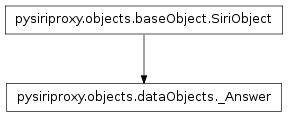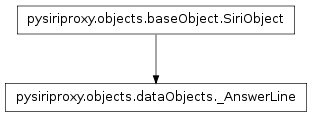The dataObjects module¶
The dataObjects module contains classes pertaining to creating objects which can be sent to the iPhone or Apples’ web server which contain various types of data to be displayed to the user.
The _Location class¶
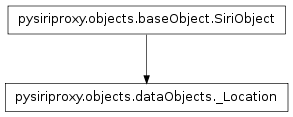
- class pysiriproxy.objects.dataObjects._Location(label=None, street=None, city=None, stateCode=None, countryCode=None, postalCode=None, latitude=None, longitude=None)[source]¶
The _Location class provides the ability to create a SiriObject which contains a specific map location to be displayed to the user.
The _CurrentLocation class¶
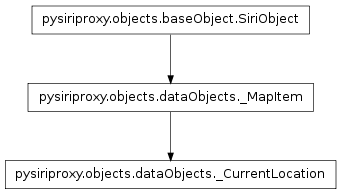
The SiriObject class¶

- class pysiriproxy.objects.dataObjects.SiriObject(className, group)¶
The SiriObject class encapsulates the base functionality for all object being sent to the iPhone or to Apple’s web server.
Note
This class is meant to be subclassed to provide the implementation for a specific object.
- ProtocolVersion¶
The identifier which indicates the version of the protocol.
- classmethod isArgumentList(obj)¶
Determine if the given object is a list of arguments, or not.
- obj – The object
- classmethod isSiriObject(obj)¶
Determine if the given object is a SiriObject, or not.
- obj – The object
- makeRoot(refId=None, aceId=None)¶
Make the SiriObject the root object.
- refId – The refId for this object
- aceId – The aceId for this object
- setAceId(aceId=None)¶
Set the ace id for this object.
- aceId – The aceId for this object
- setNonNoneArguments(argumentNames, localVars)¶
Takes a list of strings which represent names of input variables and sets properties of the same name on the current object if the value of the argument is not None.
- argumentNames – The list of argument names to set
- localVars – The local variables
- setRefId(refId=None)¶
Set the ref id for this object.
- refId – The refId for this object
- toDict()¶
Convert this object into a Python dictionary.
The _MapItem class¶
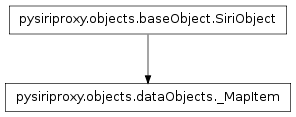
The DataObjects class¶

- class pysiriproxy.objects.dataObjects.DataObjects[source]¶
The DataObjects class provides definitions of various types of objects to display data to the Siri user.
This class also provides a factory method for creating objects of specific types.
- Answer¶
The object type corresponding to Siri’s answer to a user’s question.
- AnswerLine¶
The object type corresponding to a single answer line.
- CurrentLocation¶
The object type corresponding to creating an item on a map corresponding to the iPhone’s current location.
- Location¶
The object type corresponding to a map location.
- MapItem¶
The object type corresponding to creating an item on a map.
The _Answer class¶
